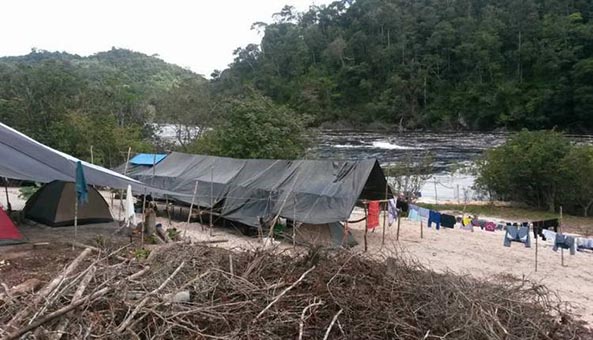A family’s struggle to reclaim inherited land from miners in Region Seven has now forced its members to live in camps along the Ekereku River as they work to find a solution to their situation.
This is the story of members of the Peters family, who have been living between Guyana and Venezuela for in excess of 20 years. The family, which comprises over 60 members, mostly from the Akawaio nation, has spent several months trying to find a solution and they would have even written letters to President David Granger and government ministers seeking an intervention.
A report published on a local news site portrayed the family as Venezuelans taking up camp along the Ekereku River with plans to develop their own village, which Norman Walker, a former Toshao and Community Development Officer (CDO) of Waramadong, Upper Mazaruni, said is far from the truth.
Walker, who spent some time working with the family to have the issue resolved, told Stabroek News that the head of the family was Eric Peters, an indigenous man from Waramadong, who had moved with his children to Turungbang, an area along the Ekereku River, more than two decades ago.
He explained that Eric and his family would have existed in Turungbang for a number of years and had several farms in the area.
However, misfortune would have befallen the family when the wife of Eric Peters died of malaria in 2014, followed by Eric himself, who died in Venezuela where he was taken for treatment for a hernia.
Walker further said that after the economic strife had hit Venezuela, the family was otherwise stuck in San Antonio, Venezuela for some time before making their way home to Guyana.
Their return home, however, proved to be an unpleasant one, Walker said, as they soon realised that their homestead had been taken over by Spanish-speaking miners, who were granted permission to carry out mining activities in the same area.
He added that their farms and house were allegedly “bulldozed” by the miners as part as an attempt to stymie any claim by the family that they previously occupied the land.
With nowhere to go and no knowledge of what can be done to have the situation rectified, Walker said the family, already large in number, relocated to their current location along the Ekereku River.
He further noted that because they no longer have access to their farms, the family is often times in need of food.
As a result, Walker said that a decision was made to reach out to the Amerindian Peoples’ Association (APA) to provide guidance or even a possible solution to the family’s plight.
‘These are our people’
Meanwhile, APA representative Laura George told Stabroek News last evening that the organisation has been working with the family over the past months to find a possible solution to its plight.
Alluding to a News Room Guyana online report, where the family had been described as Venezuelans fleeing economic hardship, George expressed her disappointment, saying that if better research was done, it would have been realised that the majority of the family are Guyanese.
“I think the whole branding of them as Venezuelans gives people the wrong impression; these are Akawaios, these are our people,” the APA representative said.
Stabroek News was told that while older members of the family are Guyanese by birth, the younger members were born in Venezuela.
According to Walker, the explanation for this comes as that was easier to access health facilities in Venezuela than in Guyana, where the family resided. The same, he said, applied to schooling and as a result the younger children were sent to school in Venezuela.
He, however, maintained that the family had traveled between Guyana and Venezuela for many years up until the death of Eric Peters in 2015.
Meanwhile, George said after Walker reached out to the APA, efforts were made to contact the family and research was done to verify their claims to the land.
She noted that once this was established, they began reaching out to various government agencies and they had even written to President Granger in hopes of some intervention. She said they would have also alerted the Guyana Geology and Mines Commission (GGMC), which sent officers to investigate but it later claimed that nothing could be done since the miners reportedly were able to produce their permits. Nevertheless, George said the Government is aware of the family’s situation and has been working with the organisation to find a possible solution, including relocating the family to a more suitable area
She further noted that that two representatives of the family and Walker had traveled to Georgetown earlier this year and they met with Minister within the Ministry of Indigenous Peoples Affairs, Valerie Garrido-Lowe to discuss the situation. This has since prompted at least two visits by the minister to the area where the family is encamped and other efforts to have members of the family registered.

